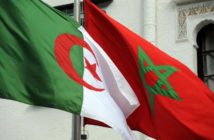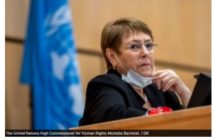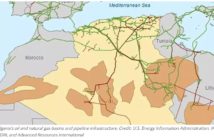Washington / Morocco News Board— Talk of self-determination for the Kabylie region is back again in full force. Celebrating the 33th anniversary of the Amazigh Spring, the Movement for the Autonomy of Kabylie (MAK) organized several important marches across the Kabylie region in Algeria demanding the right to hold a referendum for self-determination.
Kabylie activists denounced the Algerian government repression of civil rights around the country and asked for an end to the news blackout imposed on the activities and struggles of the Algerian Amazigh.
MAK supporters denounced the world community’s inattention over their plight. While the United Nations debates the right of certain ethnic groups to Self-Determination, MAK calls for an international debate on the status of the Kabylie remains ignored.
As Ban Ki-moon calls for talks regarding Catalonia’s self-rule claims and while the U.N. Security Council discusses the Algeria backed self-determination plan for the Western Sahara, MAK leadership demands equal treatment for their plea to grant self-governance rights for the Algerian Kabylie.
Meanwhile, activists reported that Algerian authorities have detained dozens of protesters in the aftermath of MAK marches, expanding their crackdown on various citizen-led campaigns to denounce abuses by the current ruling elite including President Bouteflika and the Military backed clans. Among the detained activists was Mr. Khalid Zerrari, vice president of the World Amazigh Congress (CMA-Morocco chapter), who was expulsed to his native Morocco after spending 48 hours in Algerian police custody.
MAK activists’ chief demand has been the right of the Kabylie to hold a referendum on self-determination for their region. As an activist noted, “if Algeria has always supported the principle of self-determination as the Minister of the Interior and Local Government, Dahou Ould Kablia, reiterated this week in Rabat-Morocco-, why doesn’t’ Bouteflika support the Kabylie demand for self-determination as stated in past U.N. resolutions supported by Algeria?
The troubles in the Kabylie came at a delicate time for Algerian officials struggling to contain social troubles in the oil-rich South. With multitudes of protests and displays of political and social dissatisfaction, Algerian Military are showing nervousness in the face of this unusual spread of discontents between resentful Touareg and Kabylies as well as the working class in the North.
With the approach of the Presidential elections, the Algerian authorities have been working hard to silence all forms of opposition. From jobless youths in the capital to the unemployed in the Sahara, different segments of the Algerian society have been active in denouncing the silence and inaction of their leaders.
These restrictions on freedom of expression and backsliding on fundamental rights reached fever pitch with news of a potential fourth mandate for President Bouteflika making the news rounds. Algerian authorities’ harassments of Amazigh and civil rights activists are sign of a weak central government and a “vulnerable” Military.
Even though there are several well-documented cases of Algeria’s systematic failure to respect domestic NGO’s right to freedom of expression and assembly, American and European Union diplomats continue to ignore the deteriorating rights conditions especially in the Southern Wilayas (Provinces). The world community’s indifference to the rights of the Algerian Amazigh and non-violent protesters across the North African nations is appalling.
The European and American inexplicable reluctance to demand from Algeria to uphold basic freedoms a is encouraging the Algerian Military to keep its persecution of rights group to go unabated and with impunity.






